
Art & Culture
|
Education must stress on holistic development of youth: Pratibha PatilBy Deepak Arora
Speaking as chief guest at the convocation of Manipal University here on Wednesday, President Patil said “peaceful and prosperous nations are indeed, predicated on an educated and well-informed population. Universities have a responsibility to nurture the future citizens of the country.” In this context, she emphasized on three aspects which are very important for the overall development of the youth. These are: 1. Education is about knowledge, 2 Knowledge without values is incomplete, and 3. To build a spirit of working together constructively. The President said the country's education system should strengthen adherence to secularism, inclusiveness and pluralism. She said these great values were enshrined in the country's Constitution and developed by its civilisation.
Peaceful and prosperous nations were indeed, predicated on an educated and well-informed population. She reminded the students that the large youth population of the country had a unique demographic advantage in terms of manpower availability for building the nation. “The energy of the youth and their enthusiasm must be guided into productive work,” she said. “It is important that universities have an environment conducive for the healthy growth of students so that their talents can blossom and they become positive individuals. Our nation has made significant strides. We also responded creatively to advances in electronics, communications and computer technology and, resultantly, India has emerged as a major player in these fields. To maintain a leadership role in the knowledge economy, we must focus on innovation and remain competitive.”
Making a mention of Manipal University, she said, “Today, Manipal is one of the leading academic and educational institutions in the country. I wish the University of Manipal a bright and prosperous future.” Karnataka Governor H.R. Bhardwaj and Karnataka Higher Education Minister V.S. Acharya were present.
Pro Vice-Chancellor Vinod Bhat administered the oath to students. Devisingh Shekhawat, husband of Ms. Patil, and Prafulata Bhardwaj, wife of Mr. Bhardwaj, were present.
Here is the text of the President’s speech: “I am very happy to be here at the 10th Convocation of Manipal University, an institution which is a product of the vision and commitment to education of Dr. T. Madhav Anant Pai. It started as the Academy of General Education in 1942, and after imparting education for over five decades, it became a deemed University in 1993. Today, Manipal is one of the leading academic and education institutions in the country. I wish the University of Manipal a bright and prosperous future.
One, education is about knowledge. Dear students, whatever subjects you choose you must study them well and in-depth. Merely learning for passing exams is not enough, you should comprehend the various topics through a critical and analytical process. Quest for learning and a questioning mind, push the frontiers of knowledge, and will result in delving deep into subjects, researching and innovating. As the youth, it should be your aim to become intellectually competent and technically skilled. Second, knowledge without values is incomplete. It is a value system that can prepare the younger generation to become responsible citizens who contribute to the welfare of the society, and to the advancement of the human race. Values provide an anchor in life as well as the ability to take decisions, however difficult. They make you strong and capable of withstanding the trials and tribulations of life. Concepts of peace, harmony and tolerance must be learned here. We are a democratic nation, which means there must be willingness to listen to the other's point of view, and to have respect for differing perceptions. The education system must strengthen adherence to secularism, inclusiveness and pluralism. These are the great values enshrined in our Constitution and developed by our civilization. These give strength and sustenance to our diverse multi-cultural, multi-religious and multi-lingual society.
It is important that Universities have an environment conducive for the healthy growth of the students, so that their talents can blossom and they become positive individuals. Our nation has made significant strides. We also responded creatively to advances in electronics, communications and computer technology and resultantly, India has emerged as a major player in these fields. To maintain a leadership role in the knowledge economy, we must focus on innovation and on remaining competitive. Today, we are the fourth largest economy in the world in terms of Purchasing Power Parity, and one of the fastest growing economies of the world. Given our impressive performance during the last decade, and our resilience during the global economic downturn, we can look forward to achieving double digit growth rates. However, we have to address many constraints and remove many roadblocks on our growth trajectory. For a nation which is the seventh largest in geographical terms, and the second largest in terms of population, our existing physical infrastructure is inadequate. We have to change this situation. The number of bridges, roads, harbours, as well as our power generation capacity and transport facilities, among others, require extensive additions. This means that the nation needs a large corps of well-trained engineers and technologists. Technology carries with itself the immense power to bring about revolutionary changes. Our first Prime Minister Pandit Jawaharlal Nehru said, "Who indeed could afford to ignore science today? At every turn we have to seek its aid.... The future belongs to science and those who make friends with science." A sound base of research in India had led to the Green and White Revolutions in the country, which brought about far-reaching changes. Our scientists and researchers must look at bringing in new revolutions for enhancing productivity on a sustainable basis, may it be agriculture or any other area. Unfortunately, there has been a decline in our research capacity. Teaching basic science with practical applications to change the landscape of our villages and towns should be looked at seriously by our education system. Speaking at other universities in India, I have also emphasized that the activities of good universities must strive to contribute to the richness of the cultural, literary and social aspects of their immediate community. It is in this context, that Universities must have outreach programmes that enable students to interact with local communities and understand their issues. Those who are educated must work for the upliftment of the disadvantaged sections of society as a part of their social responsibility. They can undertake social welfare work, help the poor as well as the needy and become messengers of change, and in this way, become individuals who have a sense of responsibility to society. This requires a spirit of social service. We have to reach out and connect India physically, technologically and, need I say, emotionally! Education should also broaden the outlook of the youth, moving them away from a narrow approach to life. Education should impart values to the youth that makes them sensitive to fellow human beings and the environs around them. They should learn the qualities of the head and the heart. As Nobel Laureate Rabindranath Tagore said, "The highest education is that which does not merely give us information but makes our life in harmony with all existence." Our Universities therefore, should be symbols of learning, humanism, tolerance and balanced reasoning. Practices like ragging and harassing should find no place in educational institutions. I earnestly appeal to students and educational institutions to stop this most disrespectful practice. Education involves a process of learning and sometimes unlearning as well. Learn what is good and useful to society, and unlearn what is harmful to you and society. There is one aspect that concerns me, and that is the rising habit of drug consumption among students. Drugs debilitate life and when students take to drugs they are drawn away from academic and intellectual pursuits, often disturbing campus life. There should be a campaign to make students aware of the ill effects of drug consumption. Universities help a nation in giving it economic vitality, scientific prowess, a broad outline of social change and global competitiveness. I call on the management, faculty members and students, to continue to strive for excellence. With these words, I once again, would like to say that how happy I am to be here at Manipal University. I am confident that the students who have received their degrees today will do well in their careers. You should always remember that success is based on dedication and perseverance. With these words, I wish success to the young graduates. Thank You.” World Says Hello to 2011
The new year first reached the tiny Pacific island nation of Kiribati. New Zealanders welcomed 2011 with a spectacular firework show in Auckland and celebrations elsewhere, while in Sydney, Australia, at least 1.5 million people gathered for the annual fireworks show on the Harbour Bridge. India, Hong Kong and Taiwan also celebrated with fireworks displays. Later, Moscow residents rang in 2011 in Red Square, and about 250,000 people on the banks of London's River Thames watched fireworks as the Big Ben clock at Parliament chimes in the new year. In Vatican City, Pope Benedict held a prayer service at St. Peter's Basilica. He is scheduled to hold a Mass on New Year's Day. One of the world's most popular New Year's Eve celebrations took place in New York City, where organizers say a million people were in Times Square for the annual drop of a huge, sparkling ball from high above the crowd. The Waterford Crystal ball weighs 5,400 kilograms. Recital by Ustad Amjad Ali Khan, reopening of Musical Instruments Gallery mark National Museum Day celebrationsBy Deepak Arora
The world-renowned Sarod player kept the music lovers of the National Capital spell-bound for over an hour, as the rags streaming out of his Sarod befittingly heralded the reopening of the Saran Rani Backliwal Musical Instruments Gallery packed with rare 17th century instruments among others. Presiding over the function, Jawhar Sircar, the Secretary to the Ministry of Culture, said the government was taking several initiatives to preserve the cultural heritage of the country. “Not everybody can have a National Museum as the repository of musical instruments. Musical instruments are scattered all over our country. The Centre has earmarked Rs 105 crore to help 36 museums in the country collect the rare artefacts and expand the collections,’’ he said.
In his welcome speech, the Museum Administrator Dr C V Ananda Bose said the Museum was well on the track of revival. “We are committed to produce results and not ready to take defeat. With the support of the Government, we will bring in results in the Museum, reflecting the glorious cultural heritage,’’ he said. While acknowledging it as an honour to perform in the National Museum, Ustad Ali Khan requested the Secretary and the Museum authorities to invite young scholars to research on the classical musical instruments, especially on sitar, sarangi, and santoor, and publish the research works. The acclaimed performer then rendered a captivating recital to the packed audience. After starting with Hindustani classical raga ‘alhaiya bilawal’, he moved on to ‘jaunpuri’ and then classical ‘bhairavi’, the concluding piece.
The Gallery, in the name of Sharan Rani Backliwal who passed away a couple of years ago, has a large collection of musical instruments, both folk and classical, and many of them were from the 17th and 18th Centuries. The collection was donated by Mrs Backliwal in 1980 and 1987. Most of the Indian instruments belong to the period between the 17th and19th centuries. There are also a few 19th century Western instruments. The objects have been divided into different categories like String instruments (veena, sitar, santoor), Percussion instruments (tabla, dholak) and Wind instruments (flute, trumpet). The Museum, the treasure trove of India’s glorious culture, also completed the first phase of its architectural renovation with superior lightings, fresh designs and higher aesthetic touch. As part of the modernization, display patterns in the foyer, corridors and galleries have improved. “We have set the target of reopening of the three closed galleries to bring back the glorious past of the country’s heritage into limelight. The music instruments gallery is ready in 60 days while the two galleries of wooden carving will be reopened for the public by the middle of the next month,’’ according to Dr Bose. The Foundation Day also saw the announcement of a travelling exhibition called ‘Heritage Him-sagar’, which will cover the entire stretch of the country from Kashmir to Kanyakumari on road, giving a glimpse of the country’s golden past, rare artefacts and richness of culture to the people. UK introduces online applications for Tier 2 of the points based systemNEW DELHI, Dec 15: From Monday, UK visa customers who apply for a visa under Tier 2 of the points based system, including dependants, will be required to complete their visa application forms online. UK Govt launches consultation on major reform of student visa system
The key proposed areas of reform are: raising the level of courses students can study, with only Highly Trusted Sponsors able to offer courses to adult students below degree level; introducing tougher entry criteria for adult students; ensuring students return overseas after their course; limiting the entitlements to work and to sponsor dependants; simpler procedures for checking low-risk applications and stricter accreditation procedures for education providers in the private sector. “People imagine students to be those who come here for a few years to study at university and then go home - that is not always the case. Too many students coming to study below degree level have been coming here to live and work, rather than studying. We need to stop this abuse. “This government wants high calibre students with the genuine desire to study to come to our country for temporary periods, and then return home. We want to hear views of our proposals from a wide range of people so that our reforms meet this objective.” Following the consultation, the government will make an announcement on the new student visa policy. The government plans to begin implementing the changes from April 2011. The full consultation document ‘The Student Immigration System: A Consultation’ is available at: www.ukba.homeoffice.gov.uk/student-consult-online. The research report ‘Overseas students in the immigration system: types of institution and levels of study’ is available at: http://www.ukba.homeoffice.gov.uk/sitecontent/documents/aboutus/reports/pbs-tier-4/ Current Tier 4 and student visitor visa requirements are available at: http://www.ukba.homeoffice.gov.uk/studyingintheuk/ Prof Rama Kant Agnihotri embodies great tradition of LinguisticsBook titled “Problematizing Language Studies – Cultural, Theoretical and Applied Perspectives” in honour of Rama Kant releasedBy Deepak Arora
The book is a collection of articles on the state of studies in the Indian languages carrying contributions from linguists in North America, Western Europe, South Africa and South East Asia, India and Pakistan. Dr. Ranjit Sinha presided over the function at the ICSSR. Distinguished scholars from AMU, Aligarh, Delhi University, English and Foreign Languages University, Lucknow Campus, IGNOU, IIT Delhi, IIT Madras, IIT Patna, JMI, JNU, Punjab University, Chandigarh, University of Cape Town, South Africa, friends and relatives of Ramakant, media persons and several other dignitaries were present at the book launch event.
Citing from a talk Prof Agnihotri gave at Cape Town University in South Africa some years ago, McCormick argued that learning one language does not lead to the loss of space or memory for another. There is no conflict among languages. It is among people, she said. Earlier welcoming the distinguished linguists and guests gathered from different parts of India and abroad, S Imtiaz Hasnain, an editor of the book and Professor of Linguistics at the Aligarh Muslim University, said that “India has a great tradition of studies in Linguistics and Prof Agnihotri best embodies this tradition in our time.”
The book has articles on nearly all topics in linguistics and on nearly all subjects of topical interest to contemporary scholars interested in the Indian languages, he informed the gathering. Hasnain particularly cited Prof Agnihotri’s submission to the Justice Ranganath Mishra Commission for Religious and Linguistic Minorities saying that economic backwardness of a community was closely linked with its educational backwardness. This could only be removed through good education preferably in the medium of mother tongue.
A number of other speakers including Prof Ayesha Kidwai of the Jawaharlal Nehru University, Prof Tanmoy Bhattacharya of the University of Delhi, Prof Anju Sahgal Gupta of the Indira Gandhi National Open University and Prof Pramod Pandey of the JNU also spoke on the occasion.
He gave away copies of the book to Prof Agnihotri and to the contributors to the volume.
He recalled his doctoral work with the migrant speakers of the Punjabi language in the UK and observed that research is but learning through oneself and from the opportunities continuously provided by life around us.
“God allowed us friends so that He could compensate for His lapses in families,” said Shreesh Chaudhary, the second editor of the book and Professor at IIT Madras, while proposing a vote of thanks to the distinguished gathering. Chaudhary said that friends and colleagues often taught us as much as our teachers. It was a state of the art book in the area and all institutions engaged in teaching and research in the Indian languages ought to have copies of this book, he claimed. How to improve your social skills?By Dr Agyajit Singh
One of his classmates, Sandeep (named changed) was an average student in studies but extrovert, smart and jovial in nature. He did civil engineering but could not find a suitable job. He joined M.B.A. where he sharpened his social skills. After completing his management studies, he was able to find a job as personnel manager in the same organization. After few years, by the dent of hard work and social qualities, he was made CEO and later on promoted as vice-president of the company where Hardeep was also working. He did not relish being his subordinate as he was quite superior to him in academic matters in the school. He felt frustrated and left the job and joined some other organization as an engineer. Due to the social skills the later student rose to a good position. Social skills matter a lot to be successful in life and to be effective in one’s professional life. Social skills are the most important attribute of human personality. Developing the charismatic personality of a human being is one of the main objectives of modern education. Personality is not which appears only overtly but it also involves the inner beauty of a person. What the covert qualities a person possesses cover the basic dimensions of one’s personality. A well-integrated personality means that a man is physically fit, mentally alert, emotionally matured and socially adjusted. In fact social adjustment is the main prerequisite of one’s personality. Social adjustment depends how a person has developed his social skills. Social skill is the ability to respond to a given environment in a manner that produces, maintains and enhances positive interpersonal relationships. Social skill is a part of man’s total social competency, which is the overall social functioning. It includes a composite or a multitude of generalized social skills. Social competency can be improved by teaching social behavior or social skills. It is also related with the process of socialization. Social skills are a group of skills that human beings use to interact and communicate with others. Communication is one of the components of social skills. Communication may be verbal or nonverbal. Verbal communication includes talk or conversation with others, cracking and sharing jokes with others, sharing views and discussing ideas which may be related to politics, current events, religion, fashion, music, technology, sports or movies etc. These are the common topics, which are discussed among friends while conversing with others. How much exertive and impactive you are in convincing others to your view points shows your smartness, ingenuity, knowledge, way of expression and also the technique of presenting your ideas to others. The verbal talk should be in a sequence and in smoothness of delivery i.e. it should avoid stuttering or giving any awkward pauses. Your speech should be audible and comprehensive i.e. neither too loud or harsh or too soft or slow. Your speech should help in getting ideas across i.e. words are designed to grab the attention of the listener. The non-verbal communication includes how patient listener you are and secondly how your body language works. What are your actions, reactions and responses to others in your movements, gestures, facial expression etc? Moreover how much confidant you are in your stance i.e. standing up straight, putting your eyes into the eyes of others while conversing. It will enhance your confidence. Your body language should also be attuning to your verbal message. The following guidelines are suggested which will help you in increasing and improving your social skills. -Have a positive attitude towards others. Positive attitude will lead to positive thinking and positive action. -Be optimistic in life. Never think of the adversities likely to occur. -Have a pro-social behavior. Develop the feeling of altruism and imbibe a helping attitude to others. - Consider the good and positive qualities of others and ignore their negative points.. -Express empathy in thoughts by giving accurate picture of the situation. - Give kind and sympathetic hearing to show that you understand the whole matter. -Work with smile and show your smiling and pleasing face to others while greeting. - Show good mannerism while interacting with others. -Be broad-minded and ignore the trivial matters -Make peace with the past. Forget the unpleasantness of the past, face the present with reality and think about the future rationally.. -Adopt the policy of forget and forgive. -Be very objective and don’t criticize others for nothing. - Don’t give disparaging remarks even if you don’t agree on some arguments. -Ask for help when you need it -Participate in the discussion when it is being held in a group of your peer mates. -Encourage others when it is required and praise others when it is needed. -Give feedback to your friend when he is wrong and convince him without any rancor. -Say kind words in the conversation. -Accept the differences and listen to them patiently. -Try to resolve conflicts amicably when they occur. These social skills are very useful in transforming one’s life. They can bring incredible effectiveness in your professional life. They can add new meaning and purpose to your life. They act as motivational tools and energize you to work more and more at your work place. You can win over friends with your pleasant demeanor and lead a happy, harmonious and prosperous social life. How Smart Are You?By Dr Agyajit Singh
It is a part of one’s personality. By wearing ornamental and costly clothes does not mean that an individual has become smart. Smartness includes that a person is active, has good mannerism, objective outlook towards life, takes initiative in every walk of life and leads a healthy life style. He deals with other people in an affectionate and loveable way and he can impress others with his conversation, verbal and non-verbal i.e. with his gestures, manners, movements and gait etc. He may also interact with others nicely, so that others may say that he possess a magnetic and charming personality. A charming and attractive personality is when a person possesses a well-integrated personality, which means that he is physically fit, mentally alert, emotionally balanced and socially adjusted. It is quite obvious that a well-adjusted person possesses a good personality. Social adjustment depends upon how much a person is emotionally matured and balanced. An emotionally matured person may, quite possibly, be mentally alert and a mentally alert person has good physique and may be physical fit. Smartness includes both intra-active and interactive relationships. The intra-active relation means a person’s relation with his own self so that he may harmonize with his desires, motives needs and thinking according to his immediate environment. By intra-personal relation is meant for understanding of self, access to one’s own feelings, emotions as well as understanding of one’s own cognitive strengths, styles and mental functioning. It consists of self-expression, language, music and other forms of expression. Such a person has the tendency for tension reduction, conflict resolution and stress management as early as possible. By interactive relationship means a person’s relation with other persons in his environment i.e. his parents, family members, friends, peer mates, class fellows, colleagues as well as co-workers. These relations should be harmonious, cordial and desirable. Such a person is said to have high social intelligence. Social intelligence is a part of one’s personality. Intelligence is an overall ability-a general mental ability that is complex in character and underlying a great many different functions e.g. (i) the ability to make adjustment or adaptation of the individual to his total environment (ii) the individual’s ability to learn or benefit from experiences and (iii) the ability to carry on abstract thinking. According to this concept; intelligence is of three types (i) abstract,(ii) concrete and (iii) social. Abstract intelligence is the ability to understand and deal with verbal and mathematical symbols. It consists the ability to solve problems presented in form of symbols, words, numbers, formulae and diagrams etc. Concrete intelligence is the ability to understand and deal with things; as in skilled trades and scientific appliances. Social intelligence is the ability to understand and deal with persons. It is the ability to adapt or adjust with people. It is the capacity to behave effectively in social situations. The diplomats, salesmen, the ministers, politicians, teachers, psychotherapists and religious leaders must have this type of intelligence. The socially intelligent person has the knack of getting along well with people, as he is an extraverted man. The extraverted individuals are outgoing, impulsive, uninhibited, involved in-group activities, sociable, friendly, craving for excitement and having many social contacts. According to a well known psychologist Thorndike of early 20th century who gave the concept of intelligence referred social intelligence to the person’s ability to understand and manage other people and to engage in adaptive social interactions or it can be said that social intelligence refers to the individual’s fund of knowledge about the social world. He also says that “By social intelligence is meant the ability to understand and manage men and women, boys and girls-act wisely in human relations.” Another psychologist, Wechsler says that it assesses the individual’s ability to comprehend social situations because, according to him, social intelligence is just a general intelligence applied to social situations. To conclude it may be stated that to look smart or appear smart to others, one must have high social intelligence. Social intelligence can be enhanced through learning, training and education. A child must be exposed to a good and congenial environment where he may grow, prosper and blossom, where he is able to express himself liberally, think freely and make decisions independently to solve his daily or day-to-day problems amicably. He should be given full freedom with some guided control by elders to work and learn to encounter difficulties in his early life. For understanding social intelligence how to be smart, an individual should consider the following dimensions: -Understands people’ thoughts, feelings and intensions well and also accepts others for what they are -Is good at dealing with people and is sensitive to other people’ needs and desires -Has extensive knowledge of rules and norms in human relations -Is good at taking the perspectives of other people -Adapts well in social situations -Is open to new experiences, ideas and values as well as displays interest in the world at large -Thinks before speaking and doing -Makes fair judgment about others -Is frank and honest with self and others -Displays interest in the immediate environment. Every individual can become smart in his life by increasing his social intelligence. (Dr. Agya Jit Singh is Retired Head of the Department of Psychology, Punjabi University, Patiala) |
|
|||||||
Aviation
| Business | Defence
| Foreign Affairs | Communication
| Health | India |
United Nations
India-US | India-France
| Entertainment | Sports
| Photo Gallery | Tourism
| Advertise with Us | Contact
Us
© Noyanika International, 2003-2009. All rights reserved.
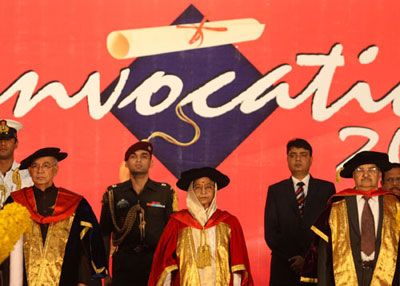 MANIPAL, Dec 8: President Pratibha Patil has said that the education system must look at the holistic development of the youth of the country.
MANIPAL, Dec 8: President Pratibha Patil has said that the education system must look at the holistic development of the youth of the country.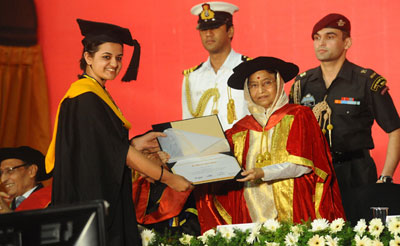 “These give strength and sustenance to our diverse multicultural, multireligious and multilingual society. We are a democratic nation, which means there must be willingness to listen to the other's point of view, and to have respect for differing perceptions,” said President Patil.
“These give strength and sustenance to our diverse multicultural, multireligious and multilingual society. We are a democratic nation, which means there must be willingness to listen to the other's point of view, and to have respect for differing perceptions,” said President Patil.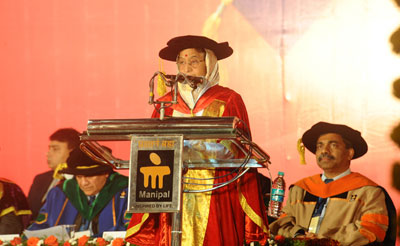 “Today, we are the fourth largest economy in the world in terms of purchasing power parity, and one of the fastest growing economies. We have to address many constraints and remove many roadblocks on our growth trajectory. For a nation which is the seventh largest in geographical terms, and the second largest in terms of population, our existing physical infrastructure is inadequate.”
“Today, we are the fourth largest economy in the world in terms of purchasing power parity, and one of the fastest growing economies. We have to address many constraints and remove many roadblocks on our growth trajectory. For a nation which is the seventh largest in geographical terms, and the second largest in terms of population, our existing physical infrastructure is inadequate.” 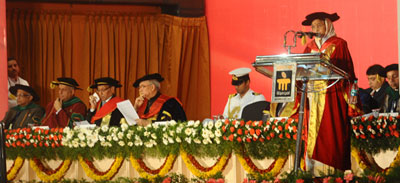 Chancellor of Manipal Univeristy Ramdas M. Pai declared the convocation open. Pro-Chancellor H.S. Ballal welcomed the gathering. Vice-Chancellor K. Ramnarayan gave an overview of the university.
Chancellor of Manipal Univeristy Ramdas M. Pai declared the convocation open. Pro-Chancellor H.S. Ballal welcomed the gathering. Vice-Chancellor K. Ramnarayan gave an overview of the university. 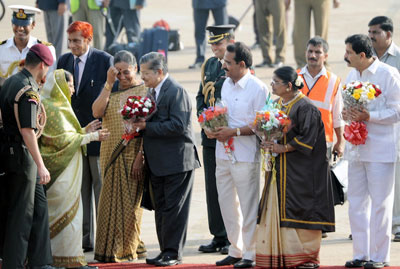 Earlier, the President was received and welcomed at the airport by Governor Hansraj Bhardwaj, Education Minister Dr V S Acharya, Deputy Commissioner of Udupi District Hemalatha P., President of Jilla Panchayath Udupi Gladis Almeida, President of Municipal Corporation Udupi Kiran Kumar, Chancellor Manipal University Dr Ramdas and his wife, Pro Chancellor Dr H S Ballal, Vice-Chancellor K. Ramnarayan and others.
Earlier, the President was received and welcomed at the airport by Governor Hansraj Bhardwaj, Education Minister Dr V S Acharya, Deputy Commissioner of Udupi District Hemalatha P., President of Jilla Panchayath Udupi Gladis Almeida, President of Municipal Corporation Udupi Kiran Kumar, Chancellor Manipal University Dr Ramdas and his wife, Pro Chancellor Dr H S Ballal, Vice-Chancellor K. Ramnarayan and others.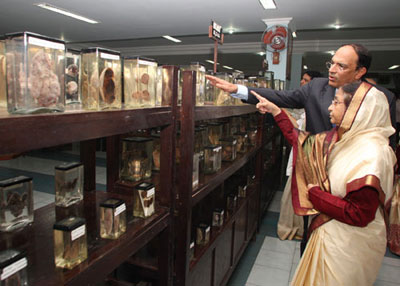 Speaking to students, I am always reminded that India with a large youth population has a unique demographic advantage in terms of manpower availability for building the nation. The energy of the youth and their enthusiasm must be guided into productive work. Their ideas and innovations tapped for the betterment of society. Peaceful and prosperous nations are indeed, predicated on an educated and well-informed population. Universities have a responsibility to nurture the future citizens of the country. The education system must look at the holistic development of the youth of the country. In this context, I would like to emphasize three aspects which are very important for the overall development of the youth.
Speaking to students, I am always reminded that India with a large youth population has a unique demographic advantage in terms of manpower availability for building the nation. The energy of the youth and their enthusiasm must be guided into productive work. Their ideas and innovations tapped for the betterment of society. Peaceful and prosperous nations are indeed, predicated on an educated and well-informed population. Universities have a responsibility to nurture the future citizens of the country. The education system must look at the holistic development of the youth of the country. In this context, I would like to emphasize three aspects which are very important for the overall development of the youth. 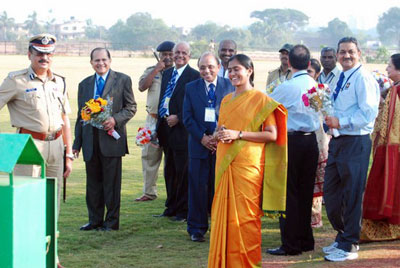 The third aspect which is important is to build a spirit of working together constructively. In this, sports play an important part. Apart from physical fitness, sports develop qualities like team spirit, discipline and learning to accept success and defeat.
The third aspect which is important is to build a spirit of working together constructively. In this, sports play an important part. Apart from physical fitness, sports develop qualities like team spirit, discipline and learning to accept success and defeat.  NEW DELHI, Dec 31: Revelers around the world, including India, marked the start of the new year with celebrations and fireworks displays.
NEW DELHI, Dec 31: Revelers around the world, including India, marked the start of the new year with celebrations and fireworks displays.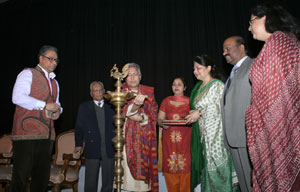 NEW DELHI, Dec 18: An enthralling recital by Sarod maestro Amjad Ali Khan, reopening of the prized Musical Instruments Gallery, launching of a travelling exhibition, and the completion of the first phase of renovation marked the 50th foundation day celebrations of the National Museum here today.
NEW DELHI, Dec 18: An enthralling recital by Sarod maestro Amjad Ali Khan, reopening of the prized Musical Instruments Gallery, launching of a travelling exhibition, and the completion of the first phase of renovation marked the 50th foundation day celebrations of the National Museum here today.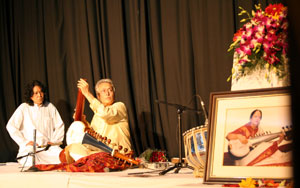 Sircar also said the Museum was also trying to preserve the vast number of audio-visual records and manuscripts and the government has launched a programme to collect instruments and objects from the individuals to add to the repository of the Museum.
Sircar also said the Museum was also trying to preserve the vast number of audio-visual records and manuscripts and the government has launched a programme to collect instruments and objects from the individuals to add to the repository of the Museum.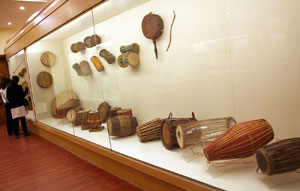 The reopening of the musical gallery, mainly consisting of the rare instruments gifted by India’s first and foremost woman Sarod guru Sharan Rani Backliwal was witnessed by her art scholar husband Sultan Singh Backliwal and their daughter Radhika Backliwal Narain, who herself is a known art collector.
The reopening of the musical gallery, mainly consisting of the rare instruments gifted by India’s first and foremost woman Sarod guru Sharan Rani Backliwal was witnessed by her art scholar husband Sultan Singh Backliwal and their daughter Radhika Backliwal Narain, who herself is a known art collector.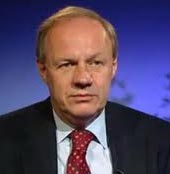 NEW DELHI, Dec 7: The UK government has published a consultation on the reform of the student entry route to the UK on Tuesday. The consultation will run for eight weeks, until 31 January 2011. The UK government wants a student visa system which continues to attract the top students to the UK’s top universities, but which is more selective and more robust.
NEW DELHI, Dec 7: The UK government has published a consultation on the reform of the student entry route to the UK on Tuesday. The consultation will run for eight weeks, until 31 January 2011. The UK government wants a student visa system which continues to attract the top students to the UK’s top universities, but which is more selective and more robust. 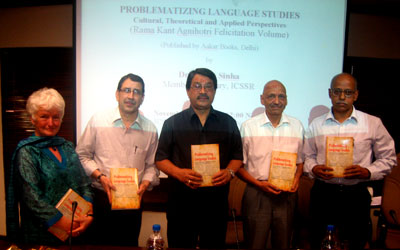 NEW DELHI, Nov 16: Dr. Ranjit Sinha, Member Secretary, ICSSR (Indian Council of Social Science Research), released here on Tuesday a felicitation volume titled “Problematizing Language Studies – Cultural, Theoretical and Applied Perspectives” in honor of Rama Kant Agnihotri, Professor of Linguistics, University of Delhi.
NEW DELHI, Nov 16: Dr. Ranjit Sinha, Member Secretary, ICSSR (Indian Council of Social Science Research), released here on Tuesday a felicitation volume titled “Problematizing Language Studies – Cultural, Theoretical and Applied Perspectives” in honor of Rama Kant Agnihotri, Professor of Linguistics, University of Delhi. 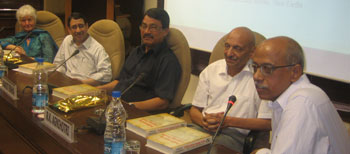 Speaking on the occasion, Prof Kay McCormick of the University of Cape Town said “multilingualism is an asset and not a liability.”
Speaking on the occasion, Prof Kay McCormick of the University of Cape Town said “multilingualism is an asset and not a liability.” 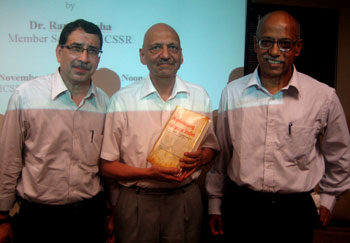 Prof Agnihotri has not only studied Indian languages but he has also worked with the living speakers of the living languages, he told the assembled linguists.
Prof Agnihotri has not only studied Indian languages but he has also worked with the living speakers of the living languages, he told the assembled linguists.  And this is possible only if the state policy towards language education sheds its biases and shows its willingness to accommodate the aspirations of the marginalized language groups. Just as a mother can not be ignored in any scheme of development of a child, mother tongue can not be ignored in any scheme of education of the child, he said.
And this is possible only if the state policy towards language education sheds its biases and shows its willingness to accommodate the aspirations of the marginalized language groups. Just as a mother can not be ignored in any scheme of development of a child, mother tongue can not be ignored in any scheme of education of the child, he said.  Recalling his long association with Rama Kant as a friend, Dr Ranjeet Sinha, Member Secretary, ICSSR, said it is most befitting to have this occasion organized in the premises of the ICSSR, for Ramakant had his first project sponsored by the ICSSR.
Recalling his long association with Rama Kant as a friend, Dr Ranjeet Sinha, Member Secretary, ICSSR, said it is most befitting to have this occasion organized in the premises of the ICSSR, for Ramakant had his first project sponsored by the ICSSR. 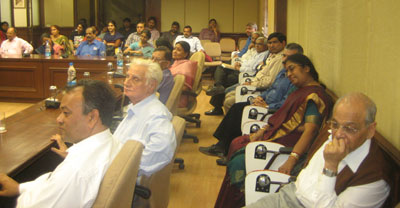 Prof Agnihotri, in his response, recalled his life-long experience of learning languages and linguistics from his associates and friends in Rajdhani College, New Delhi; University of Delhi and elsewhere in India and abroad where he had a chance to study and work.
Prof Agnihotri, in his response, recalled his life-long experience of learning languages and linguistics from his associates and friends in Rajdhani College, New Delhi; University of Delhi and elsewhere in India and abroad where he had a chance to study and work. 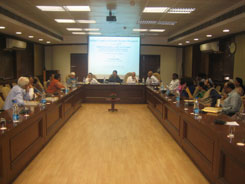
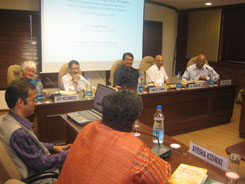
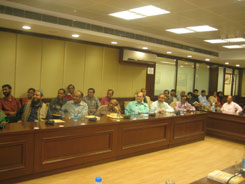
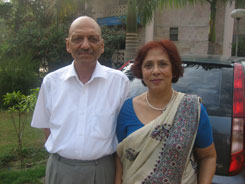
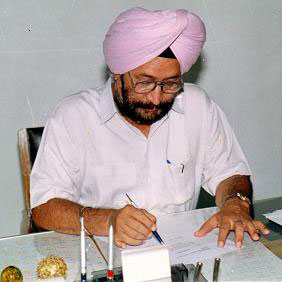 BOSTON: Hardeep (name changed) was a very studious student when I was working as a school teacher at Chandigarh. He was introvert, shy but snobbish in nature. He used to stand first in his class. He completed degree in mechanical engineering and joined an organization as an engineer.
BOSTON: Hardeep (name changed) was a very studious student when I was working as a school teacher at Chandigarh. He was introvert, shy but snobbish in nature. He used to stand first in his class. He completed degree in mechanical engineering and joined an organization as an engineer. 
